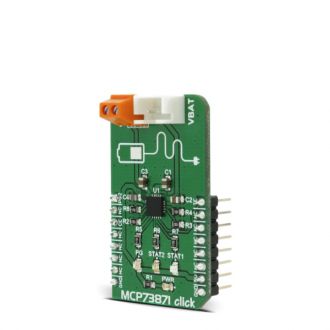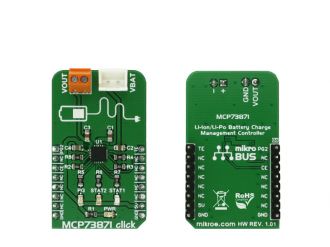
We strongly encourage users to use Package manager for sharing their code on Libstock website, because it boosts your efficiency and leaves the end user with no room for error. [more info]

Rating:
Author: MIKROE
Last Updated: 2018-03-13
Package Version: 1.0.0.0
mikroSDK Library: 1.0.0.0
Category: Battery Charger
Downloaded: 6288 times
Not followed.
License: MIT license
MCP73871 Click is a fully integrated solution for system power delivery and Li-Po/Li-Ion battery charge management. The click features many Li-Po/Li-Ion battery charging optimizations, used to maximize the battery life.
Do you want to subscribe in order to receive notifications regarding "MCP73871 click" changes.
Do you want to unsubscribe in order to stop receiving notifications regarding "MCP73871 click" changes.
Do you want to report abuse regarding "MCP73871 click".


Library description
Key functions:
void mcp73871_enablePinControl(uint8_t pinState)- Controls the enable pin, enabling or disabling the click as needed
void mcp73871_progPinControl(uint8_t pinState)- Sets the input current to either 100 or 500 mA
void mcp73871_timerPinControl(uint8_t pinState)- Enables or disables the safety timer
Example description
The application is composed of three sections:
void applicationTask()
{
//Enables the click - Note: this is already done in driver initialization
mcp73871_enablePinControl(1);
//Sets input current to 100 mA - Input value of 1 sets the current to 500 mA.
mcp73871_progPinControl(0);
//Enables safety timer
mcp73871_timerPinControl(0);
}